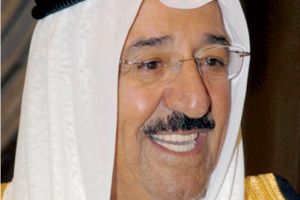 As I speculated just yesterday, "the opposition" (read: al-Wifaq) has formally agreed to Kuwaiti mediation of the political crisis in Bahrain. The Al-Wasat headline from this morning says it all: "Kuwaiti Mediation Delegation: We have received a response from the opposition that it agrees to the Crown Prince's dialogue initiative without preconditions."
As I speculated just yesterday, "the opposition" (read: al-Wifaq) has formally agreed to Kuwaiti mediation of the political crisis in Bahrain. The Al-Wasat headline from this morning says it all: "Kuwaiti Mediation Delegation: We have received a response from the opposition that it agrees to the Crown Prince's dialogue initiative without preconditions."So far I do not see other English-language newspapers picking up this story, but the writing was clearly on the wall yesterday after al-Wifaq all but condemned what protesters had dubbed Bahrain's "Day of Rage II," and after attendees of Sh. 'Isa Qasim's Friday prayer returned home without a peep.
Yet in another sense this outcome was guaranteed much earlier, with the creation of what can only be described as the highly-ambitious "Coalition for a Republic." In fact, of course, there was never going to be a Republic of Bahrain--not with Saudi next door, and not with the U.S.'s unrelenting support of the Bahraini government. The formation of the Coalition clearly overstepped what the Al Khalifa were willing to tolerate in terms of political protest. More importantly, it severely undercut al-Wifaq's position--seemingly a strong one at the time--that there should be some basic preconditions to the dialogue process. Now, some two weeks later, al-Wifaq is is no position to be making demands of its own, and must therefore agree to an unconditional dialogue.
The question now is how much influence the Crown Prince has retained after the debacle of the last two weeks. Is he still in a position within the ruling family even to conduct a "national dialogue"? And, equally importantly, has the extent of what he is capable of offering in terms of political reform decreased dramatically over this time?
Finally, now that Ebrahim Sharif is under arrest, will Wa'ad have no place at all in the dialogue initiative? One may speculate that this is precisely the government's plan: to ensure that the "opposition" with which it is bargaining is strictly a "Shi'a opposition," which if nothing else is at least convenient in terms of framing the issue. Indeed, the notion that secular Sunnis and Shi'is would come together to demand political change is a very dangerous one from the standpoint of the state, in the long-term maybe more dangerous perhaps even than a "Shi'a opposition."
The loss of Ebrahim Sharif in the negotiation process, then, would not be inconsiderable, though perhaps he will be allowed to take part in the end. Wa'ad, which for the last 8 years has been unable to win a single seat in parliament due to institutional design (especially single-member districts), despite relatively high support, would have stood to gain much from any reform.
Now, to end on an altogether different note: yet another of the leading opposition figures, Sh. 'Abd al-Jalil al-Miqdad, was arrested last night around 2:30am. If you want to see some pictures of the Law and Order-style rummaging through his home, they are available here. The lesson seems to be, then: accept dialogue or be arrested.
Update: according to the New York Times (quoting the Kuwaiti daily al-Siyassah), members of al-Wifaq will arrive in Kuwait today and will meet, among others, Kuwaiti Parliament Speaker Jasim al-Kharafi.
No comments:
Post a Comment
Note: Only a member of this blog may post a comment.